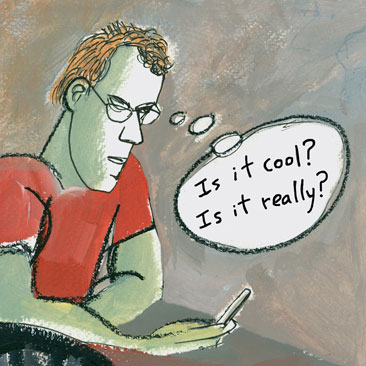 Every Saturday, we’ll be posting a new illustration by David Lester. The Mecca Normal guitarist is visually documenting people, places and events from his band’s 26-year run, with text by vocalist Jean Smith.
Every Saturday, we’ll be posting a new illustration by David Lester. The Mecca Normal guitarist is visually documenting people, places and events from his band’s 26-year run, with text by vocalist Jean Smith.
Continued from last week.
Veronica repeatedly encounters deception while she tentatively advances with men she needs to trust. She forcefully articulates what she requires in a partner, but she is soon vacillating emotionally in short relationships with men who are arrogant and critical, more than encouraging and responsive. Regardless, it is deception that halts the proceedings each time. It seems unlikely that she will meet a man she can trust enough to proceed.
***
Victor sends Celia a message acknowledging his interest in exploring similar terrain, and the pair commence with practical experience, even though they have different ideas about what sort of relationship it is. Celia wonders if Victor is actually treating her like a whore or if he is, as Celia has directed, pretending to treat her like a whore. The distinction is distracting Celia from what she wants to experience, and there isn’t really an opportunity to clarify as things become more intense. Victor later reveals that he was having such a good time, that he wasn’t considering Celia’s experience before, during or after sex. The very brief experiment ends with Celia feeling used and deceived.
Celia halts her online exploration in favour of being happy alone—a state that friends insist is optimal for meeting men. When Celia meets Reggie, he admits that he’s had emotional problems, but Celia knows she’s strong; she can deal with Reggie’s instability. She wants to help him. Reggie appears to be very nice, in an anxious, self-deprecating way. Celia thinks Reggie will appreciate her. After all the deception she’s experienced, Celia really enjoys trusting Reggie. She trusts him because she wants to trust a man, but Reggie is “being nice” to protect himself—he is pretending to be someone he thinks Celia wants to be with. Reggie, under pressure to live up to Celia’s expectations, takes a cowardly approach and tries to get Celia to break up with him. He lies to Celia and blames her for making him lie. To Celia, it appears that the whole relationship has been deception from beginning to end.
Celia understands that she selects insecure, deceptive and emotionally unstable men and commences with helping them. That was her role when her parents fought, when her father yelled and drank. It was Celia’s responsibility to understand all the moods in the house; it was her job to fix all their problems. Celia fears that if she isn’t helping men, they won’t love her. Invariably the man is disappointed in himself, based on all the things Celia wants him to fix about himself—and he blames Celia.
Reggie breaks up with Celia in an email saying, “How much abuse should I take?” Celia feels the familiar urge to help Reggie understand what is really happening, and this results in Reggie becoming belligerent. Celia ends communication.
Celia meets a brilliant screenwriter who admires her work. On their second meeting, to avoid repeating the pattern she now recognizes, Celia asks Giorgio if he has ever been diagnosed with a mental illness or personality disorder—and yes, he has. Celia watches herself trying to justify continuing to see Giorgio, but quickly halts their association, returning to the matter at hand: finishing the screenplay.













